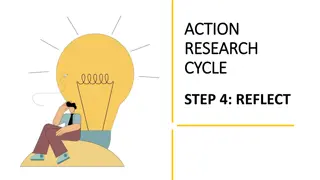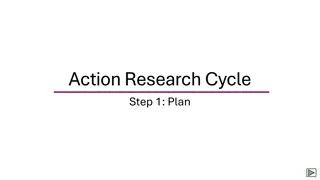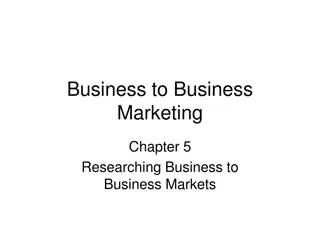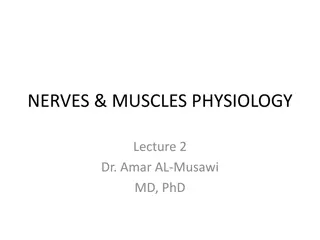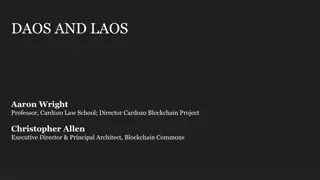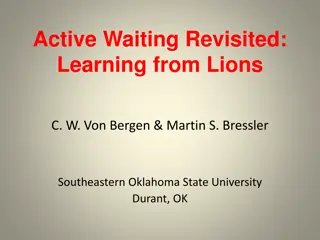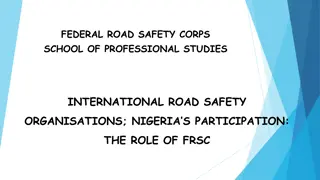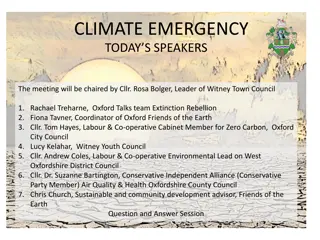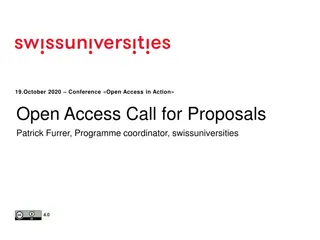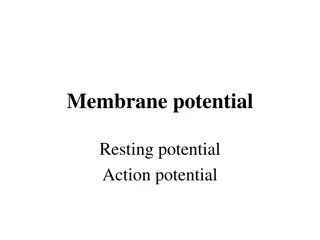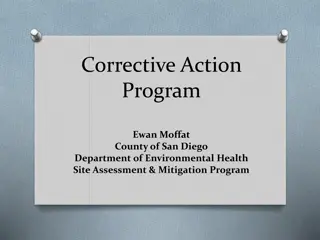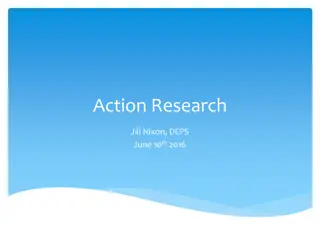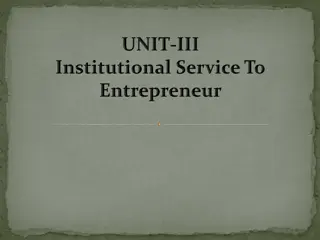Action Research in Organizations
Strategy for finding solutions to organizational difficulties, learning by doing, types of action research groups, stages of action research, and examples. Action research involves identifying problems, taking actions to address them, measuring effectiveness, and iterating if necessary.
Download Presentation

Please find below an Image/Link to download the presentation.
The content on the website is provided AS IS for your information and personal use only. It may not be sold, licensed, or shared on other websites without obtaining consent from the author.If you encounter any issues during the download, it is possible that the publisher has removed the file from their server.
You are allowed to download the files provided on this website for personal or commercial use, subject to the condition that they are used lawfully. All files are the property of their respective owners.
The content on the website is provided AS IS for your information and personal use only. It may not be sold, licensed, or shared on other websites without obtaining consent from the author.
E N D
Presentation Transcript
StudyMafia.Org Action Research Submitted To: Submitted By: Studymafia.org Studymafia.org
Table Contents Definition Introduction Groups of Action Research Stages of Action Research Examples of Action Research Conclusion 2
Definition Action research is a strategy that tries to find realistic solutions to organizations difficulties and issues. It is similar to applied research. 3
Introduction Action research is basically learning by doing. First, a problem is identified, then some actions are taken to address it, then how well the efforts worked are measured, and if the results are not satisfactory, the steps are applied again. The best way to get things accomplished is to do it yourself. This statement is utilized in corporations, community projects, and national governments. 4
Groups of Action Research Positivist: This type of research is also called classical action research. It considers research a social experiment. This research is used to test theories in the actual world. Critical: This is a sort of action research that takes a critical approach to corporate systems and tries to enhance them. 6
Groups of Action Research Interpretive: This kind of research is called contemporary action research. It thinks that business reality is socially made, and when doing this research, it focuses on the details of local and organizational factors. 7
Stages of Action Research Stage 1: Plan For an action research project to go well, the researcher needs to plan it well. After coming up with a research topic or question after a research study, the first step is to develop an action plan to guide the research process. The research plan aims to address the study s question. 8
Stages of Action Research Stage 2: Act The next step is implementing the plan and gathering data. At this point, the researcher must select how to collect and organize research data. The researcher also needs to examine all tools and equipment before collecting data to ensure they are relevant, valid, and comprehensive. 9
Stages of Action Research Stage 3: Observe Data observation is vital to any investigation. The action researcher needs to review the project s goals and expectations before data observation. This is the final step before drawing conclusions and taking action. 10
Stages of Action Research Stage 4: Reflect This step involves applying a prospective solution and observing the results. It s essential to see if the possible solution found through research can really solve the problem being studied. 11
Examples of Action Research Action research initiatives are frequently situation-specific. Still, other researchers can adapt the techniques. The example is from a researcher s (Franklin, 1994) report about a project encouraging nature tourism in the Caribbean. 12
Examples of Action Research In 1991, action research was launched to study how nature tourism may be implemented on the four Windward Islands in the Caribbean: St. Lucia, Grenada, Dominica, and St. Vincent. For environmental protection, a government- led action study determined that the consultation process needs to involve numerous stakeholders, including commercial enterprises. 13
Examples of Action Research First, two researchers undertook the study and held search conferences on each island. The search conferences resulted in suggestions and action plans for local community nature tourism sub-projects. Several islands formed advisory groups and launched national awareness and community projects. 14
Examples of Action Research Regional project meetings were held to discuss experiences, self-evaluations, and strategies. Creating a documentary about a local initiative helped build community. And the study was a success, leading to a number of changes in the area. 15
Conclusion Action research is a process for improving educational practice. Its methods involve action, evaluation, and reflection. It is a process to gather evidence to implement change in practices. Action research is participative and collaborative. It is undertaken by individuals with a common purpose. 17
Thanks To StudyMafia.org

 undefined
undefined






